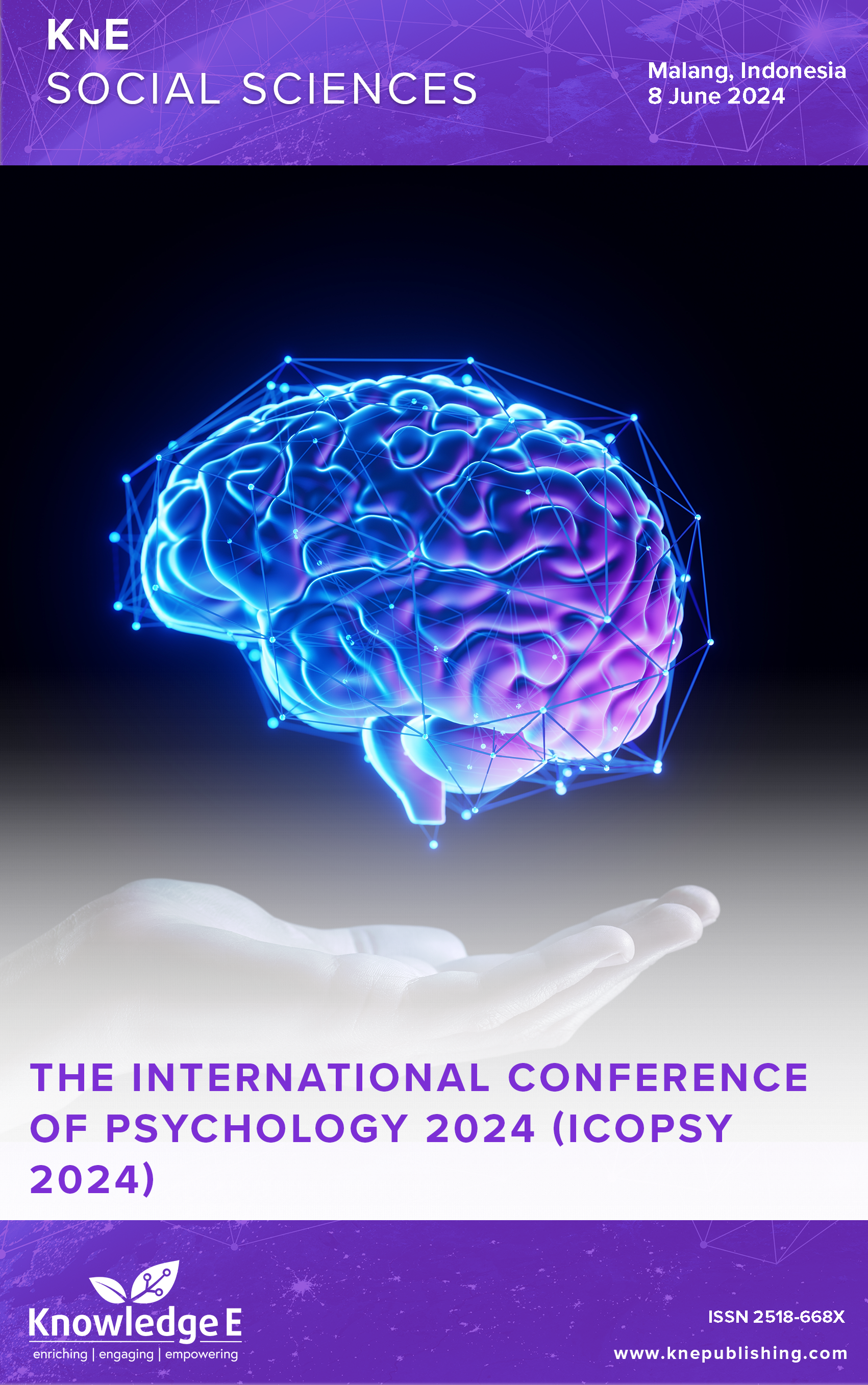Religion and Environment: The Role of Religiosity on Pro-environmental Behavior Among University Students in Indonesia
DOI:
https://doi.org/10.18502/kss.v9i30.17510Abstract
Numerous environmental problems in various countries occur as a result of human misbehavior in interacting with their environment. Therefore, to maintain balance in the relationship between humans and the natural environment, it is necessary to develop pro-environmental behavior. This study aims to investigate the role of religiosity on pro-environmental behavior. This research employed a quantitative-correlational method. The participants in this study were 205 university students aged 18-24 years who were selected by convenience sampling technique. This study used two primary instruments to measure the two research variables: Religious Commitment Inventory - 10 (RCI-10) to measure religiosity and the General Ecological Behavior Scale to measure pro-environmental behavior. The research data were analyzed using regression analysis techniques. The analysis showed that religiosity has a significant role as a predictor of pro-environmental behavior among university students. This means that the higher the level of religiosity, the higher pro-environmental behavior. These findings have practical implications for environmental conservation programs. It is important to develop pro-environmental behavior intervention programs for the community by instilling religious values that could encourage awareness, and then behavior, of environmental sustainability.
Keywords: religion, religiosity, pro-environmental behavior, environmental psychology, environment
References
Gardner GT, Stern PC. Environmental problems and human behavior. Pearson Custom Pub.; 2002.
Barra RO. The 2019 Global Environment Outlook and Global Chemicals Outlook: challenges for environmental toxicology and chemistry in Latin America. Curr Opin Green Sustain Chem. 2020;25:100352. DOI: https://doi.org/10.1016/j.cogsc.2020.100352
Llorca M, Álvarez-Mu noz D, Ábalos M, Rodríguez-Mozaz S, Santos LH, León VM, et al. Microplastics in Mediterranean coastal area: toxicity and impact for the environment and human health. Trends in Environmental Analytical Chemistry. 2020;27:e00090. DOI: https://doi.org/10.1016/j.teac.2020.e00090
Ritchie H, Roser M. (2018). Plastic pollution. Our world in data.org. https://ourworldindata.org/plastic-pollution
Tang Y, Liu Y, Chen Y, Zhang W, Zhao J, He S, et al. A review: research progress on microplastic pollutants in aquatic environments. Sci Total Environ. 2020;142572: https://doi.org/10.1016/j.scitotenv.2020.142572. DOI: https://doi.org/10.1016/j.scitotenv.2020.142572
Bhatt P, Gangola S, Bhandari G, Zhang W, Maithani D, Mishra S, et al. New insights into the degradation of synthetic pollutants in contaminated environments. Chemosphere. 2020;128827: https://doi.org/10.1016/j.chemosphere.2020.128827. DOI: https://doi.org/10.1016/j.chemosphere.2020.128827
A GK, K A, M H, K S, G D. Review on plastic wastes in marine environment - Biodegradation and biotechnological solutions. Mar Pollut Bull. 2020 Jan;150:110733. DOI: https://doi.org/10.1016/j.marpolbul.2019.110733
Dong L, Tong X, Li X, Zhou J, Wang S, Liu B. Some developments and new insights of environmental problems and deep mining strategy for cleaner production in mines. J Clean Prod. 2019;210:1562–78. DOI: https://doi.org/10.1016/j.jclepro.2018.10.291
Andrade-Sanchez JA, Eaton-González R. Chapter 18: Cybercartography as a transdisciplinary approach to solve complex environmental problems: A case study of the Kumeyaay Peoples of Baja California and the conservation of oak trees. In: Taylor DR, Anonby E, Murasugi KB, editors. Further Developments in the Theory and Practice of Cybercartography. Volume 9. Academic Press; 2019. pp. 317–29. DOI: https://doi.org/10.1016/B978-0-444-64193-9.00018-X
Su F, Li M, Shanthini A, Parthasarathy R. Systematic effective modeling and geospatial information framework for environmental issues in urban areas. Environ Impact Assess Rev. 2021;86:106507. DOI: https://doi.org/10.1016/j.eiar.2020.106507
Kollmuss A, Agyeman J. Mind the Gap: why do people act environmentally and what are the barriers to pro-environmental behavior? Environ Educ Res. 2002;8(3):239– 60. DOI: https://doi.org/10.1080/13504620220145401
Stern PC. Toward a coherent theory of environmentally significant behavior. J Soc Issues. 2000;56(3):407–24. DOI: https://doi.org/10.1111/0022-4537.00175
Nordlund AM, Garvill J. Value Structures behind Proenvironmental Behavior. Environ Behav. 2002;34(6):740–56. DOI: https://doi.org/10.1177/001391602237244
Kaiser FG, Oerke B, Bogner FX. Behavior-based environmental attitude: development of an instrument for adolescents. J Environ Psychol. 2007;27(3):242–51. DOI: https://doi.org/10.1016/j.jenvp.2007.06.004
Mokhlis S. Relevancy and measurement of religiosity in consumer behavior research. Int Bus Res. 2009;2(3):75–84. DOI: https://doi.org/10.5539/ibr.v2n3p75
Worthington EL Jr, Wade NG, Hight TL, Ripley JS, McCullough ME, Berry JW, et al. The Religious Commitment Inventory—10: Development, refinement, and validation of a brief scale for research and counseling. J Couns Psychol. 2003;50(1):84–96. DOI: https://doi.org/10.1037//0022-0167.50.1.84
Maliki Z. (2011). Agama dan lingkungan hidup: Ke arah pembentukan perilaku etis-ekologis untuk mengembangkan green-ecology. Salam, 14(1), 137–147. http://ejournal.umm.ac.id/index.php/salam/article/view/1608
Widagdo HH. Relasi alam dan agama (Sebuah upaya penyelarasan antara budaya mistis dengan pelestarian lingkungan). Esensia: Jurnal Ilmu-Ilmu Ushuluddin. 2012;13(2):263–76. DOI: https://doi.org/10.14421/esensia.v13i2.741
Chung MG, Kang H, Dietz T, Jaimes P, Liu J. Activating values for encouraging proenvironmental behavior: the role of religious fundamentalism and willingness to sacrifice. J Environ Stud Sci. 2019;9(4):371–85. DOI: https://doi.org/10.1007/s13412-019-00562-z
van Riper CJ, Lum C, Kyle GT, Wallen KE, Absher J, Landon AC. Values, Motivations, and Intentions to Engage in Proenvironmental Behavior. Environ Behav. 2018;52(4):437–62. DOI: https://doi.org/10.1177/0013916518807963
Preston JL, Baimel A. Towards a psychology of religion and the environment. Curr Opin Psychol. 2021 Aug;40:145–9. DOI: https://doi.org/10.1016/j.copsyc.2020.09.013
Bhuian S, Sharma SK. Predicting consumer pro-environmental behavioral intention: the moderating role of religiosity. Review of International Business and Strategy. 2017;27(3):352–68. DOI: https://doi.org/10.1108/RIBS-03-2017-0022
Taylor B, Wright J, LeVasseur T. Dark green humility: religious, psychological, and affective attributes of proenvironmental behaviors. J Environ Stud Sci. 2020;10(1):41– 56. DOI: https://doi.org/10.1007/s13412-019-00578-5
Firmansyah F, Purnamasari PE, Djakfar M. Religiusitas, lingkungan, dan pembelian green product pada konsumen generasi Z. Iqtishoduna: Jurnal Ekonomi Dan Bisnis Islam. 2019;15(1):57–70. DOI: https://doi.org/10.18860/iq.v1i1.5779
Islam T, Chandrasekaran U. Effect of religiosity on ecologically conscious consumption behaviour. J Islamic Mark. 2016;7(4):495–507. DOI: https://doi.org/10.1108/JIMA-01-2015-0006
Yu TY, Lavallee JP, Di Giusto B, Wang FK. (2019). Exploring the Influence of Religiosity on Engaging in Pro-Environmental Behaviours for College Students at Taiwan under the Climate Change Environment. Proceedings of the 8th International Conference on Informatics, Environment, Energy and Applications, 21–25. DOI: https://doi.org/10.1145/3323716.3323736
Agag G, Colmekcioglu N. Understanding guests’ behavior to visit green hotels: the role of ethical ideology and religiosity. Int J Hospit Manag. 2020;91:102679. Available from: https://doi.org/https://doi.org/10.1016/j.ijhm.2020.102679 DOI: https://doi.org/10.1016/j.ijhm.2020.102679
Minton EA, Johnson KA, Liu RL. Religiosity and special food consumption: the explanatory effects of moral priorities. J Bus Res. 2019;95:442–54. Available from: https://doi.org/https://doi.org/10.1016/j.jbusres.2018.07.041 DOI: https://doi.org/10.1016/j.jbusres.2018.07.041

